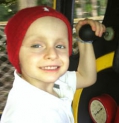Improving homing and activity of CAR T cells in pediatric sarcomas

Despite various treatment options, cure rates for sarcoma patients continue to be very poor. Many researchers have developed new therapies that harness the immune system to cure cancers; however, most of these treatments (called immunotherapies) are not effective in solid tumors. One of the most promising therapies involves T cells expressing artificial receptors that allow them to recognize and kill cancer cells. These therapies called “chimeric antigen receptor (CAR)” T cells have been transformative for pediatric leukemia, but CAR-T cells do not properly migrate to solid tumors, and when they do, their activity is compromised. In our lab, we are testing new methods to help CAR-T cells home into sarcoma, and in this grant I will test the most promising approach we have identified to date. Moreover, pediatric sarcomas have abundant immune cells called tumor associated macrophages (TAMs) that help tumors grow, preventing immunotherapies, such as CAR-T cells, from working. We suspect TAMs help tumors through a process called “efferocytosis.” Normally, efferocytosis helps our bodies to clear dead/injured tissue, and block activation of the immune system to prevent autoimmunity. I previously found that leukemia cells hijack this process to inhibit the immune system, and inhibiting efferocytosis boosted the immune system’s ability to destroy leukemia cells. In this research, I will test whether efferocytosis inhibition enhances CAR-T cell activity in pediatric sarcomas.
Project Goal:
The major goals of this project are to improve the migration of CAR-T cells into pediatric sarcoma (SA1) and to inhibit efferocytosis-mediated CAR-T dysfunction in the pediatric sarcoma tumor microenvironment (SA2). We identified a specific homing molecule (also known as a “chemokine”) called IL-8 that is released by sarcoma cells after clinically achievable irradiation. However, CAR-T cells do not normally express the IL-8 receptor which would allow them to migrate into the sarcoma. We have modified CAR-T cells to express IL-8 receptors (CXCR1 and CXCR2). We will use these modified CAR-T cells to drive migration towards IL-8 gradients expressed by sarcoma tumors. To test whether we can improve the function of CAR-T cells within the tumor, we will combine CAR-T cell therapy with a small molecule-targeted drug that inhibits efferocytosis. Importantly, this is an orally active drug which is currently in clinical trials (NCT04946890, NCT04762199, NCT03510104, and NCT04872478). We expect that, by expressing the IL-8 receptors and inhibiting efferocytosis, CAR-T cells can better find their way to sarcoma and will not become inactivated within the tumor site. The results from this project will test an approach that can be rapidly translated to children and young adults with sarcomas. Additionally, since many tumors express IL-8 and mediate efferocytosis, this approach may have broad applicability to many solid tumors that occur in children and adults.

